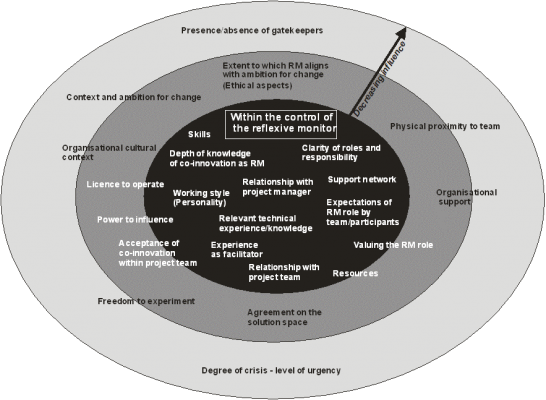About Reflexive Monitoring
The role of a reflexive monitor, in the New Zealand context, is still evolving but is influenced by the thinking of van Mierlo et al. (2010). Van Mierlo et al. (2010 p.11) define reflexive monitoring as a role that:
"encourages participants to keep reflecting on the relationships between the key items: the ambitions of the project, usual practices and the way they are embedded in the institutions, plus the developments in the system that offer opportunities for realising the ambitions of systems innovation."
Arkesteijn et al. (2015) notes that a reflexive monitor is an observer, facilitator and sparring partner to encourage participants to reflect on the relationships between project activities, the system context and the ambition for change. Van Mierlo et al. (2010) also makes clear that a reflexive monitor should not have to fulfil too many other tasks within the project in order to ensure they can maintain good distance and provide encouragement for continuing to focus on the system change required.
The New Zealand Experience
Based on the experiences of those operating as reflexive monitors in the MBIE-funded Primary Innovation programme it is clear that there is no one size fits all definition or approach to reflexive monitoring, as there are examples across the entire spectrum identified by van Mierlo et al (2010). All (those interviewed) agreed that the role is about supporting the project manager and team to achieve the project goals; it is “a supporting role but a critical supporting role” and “a role that doesn’t get much recognition”. Other aspects of the role are identified in the table below.
As one reflexive monitor noted: “you adapt your skills to the role, and Reflexive Monitors require certain personality traits and mind-set rather than particular skills…always open to other viewpoints; strong team mentality and wanting to see collaboration and co-learning outcomes; highly objective outlook”
Role Description
Although a one-size-fits-all approach to reflexive monitoring does not exist, a generic job description has been developed based on the common experiences of current reflexive monitors in New Zealand.
A Reflexive Monitor...
Reports to: The project leader
Interacts with:
- The project team
- The project leader
- Stakeholders
Position Scope: Works collaboratively with the project leader, project team members and participants to assist them in delivering the impact desired by everyone involved in the project.
Tasks:
- Support the project manager
- Help get the project team where it needs to go
- Identify conflict within the project team
- Make sure the right stakeholders are involved
- Determine whether learning is taking place
- Determine whether collaborative actions are designed and implemented (to achieve the system change)
- Encourage project participants to reflect upon the relationship between the project and its context, between project activities and between short-term objectives and long-term goals
- Identify, implement and facilitate appropriate interventions in the project to address problems and challenges that have triggered the need for intervention
- Monitor, evaluate and record processes, actions and outcomes from innovation project activities
- Continually build knowledge and expertise in the application of reflexive methods
- Assist the group to articulate and achieve a shared ambition for change, observe how this change ambition is articulated by participants.
- Encourage the project to proceed in a manner which is consistent with co-innovation principles
- Ensure reflection is built into the process in order to progress the shared ambition and achieve system change
- Provide advice to the project team on actions or processes to enhance group functioning (supported by the other roles)
- Ensure trade-offs of project decisions are recognised
Skills/Competencies:
- Ability to quickly appreciate and reflect the wording, language and world views of the innovation project team and participants
- Ability to apply both appreciative enquiry and critical analysis methods where appropriate:
- Appreciative enquiry – Reflexive Monitor becomes an involved participant using a constructive and exploratory mind-set
- Critical analysis – Reflexive Monitor becomes an involved outsider providing norms and structures to the project participants based on co-innovation principles
- Experience with multiple methods of observation
- Knowledge of the monitoring cycle and its application to both projects and the system projects seek to change
- Knowledge of co-innovation principles
- Experience working in trans-disciplinary teams
Professional behaviours:
- Build and retain trust with the innovation project leader, team and participants
- Maintain an appropriate level of distance from project to ensure impartiality
- Maintain awareness of how the innovation project team and participants work to ensure the appropriate balance of appreciative inquiry and critical analysis
How Characteristics of a Project Influence the Role of Reflexive Monitor
The figure below was created during a workshop with Reflexive Monitors in the Primary Innovation programme. It was designed to provide understanding on the characteristics of a project and its participants which influence the role and the level of control a Reflexive Monitor has in influencing these project characteristics.
Influences which are located closer to the centre of the bull's-eye are those which a reflexive monitor has more control of influencing. These include the relationship with the project manager, having a support network, and experience as a facilitator.
The further outside the bull's-eye the less influence a reflexive monitor has in impacting these influences. In fact these characteristics will influence how the Reflexive Monitor does their job.

Not all characteristics identified above have the same level of influence on the Reflexive Monitor role as others. Based on the views of Reflexive Monitors the most important characteristics for the role were:
- Personal skills
- Relationship with project manager
- Having a support network
- Having a clear job description
- Having freedom to experiment
- The expectations of the reflexive monitor role by the project team

